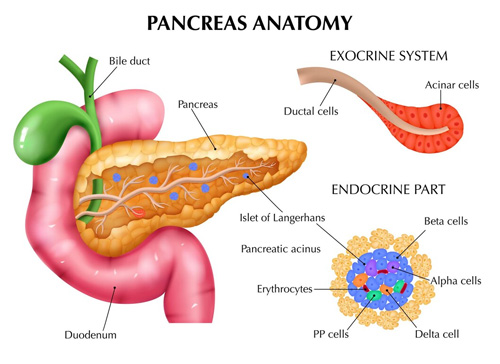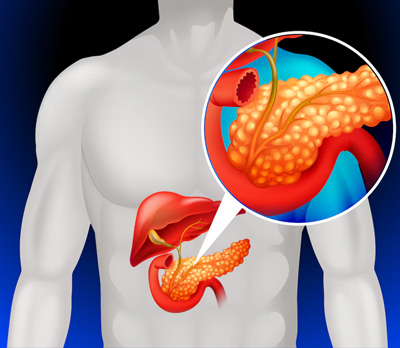Introduction
Pancreatitis is inflammation of the pancreas. The pancreas is a large gland behind the stomach and close to the duodenum—the first part of the small intestine.
The pancreas secretes digestive juices, or enzymes, into the duodenum through a tube called the pancreatic duct. - - - - - - Pancreatic enzymes join with bile—a liquid produced in the liver and stored in the gallbladder—to digest food.
Pancreas also releases the hormones insulin and glucagon into the bloodstream. These hormones help the body regulate the glucose it takes from food for energy.
Understanding Pancreatitis
Pancreatitis is a condition characterised by inflammation of the pancreas, a vital organ located behind the stomach. The pancreas plays a crucial role in digestion by secreting digestive enzymes and regulating blood sugar levels through hormone production. Pancreatitis can manifest as acute or chronic, with symptoms ranging from mild discomfort to severe pain and complications.

Causes of Pancreatitis
- Long term alcohol abuse.
- biliary tract disease
- Long term biliary tract disease.
- These patients are usually middle-aged males.
- Hypercalcemia, hyperlipidemia.
- Long-standing obstruction of the pancreatic duct by pseudocysts, calculi, trauma, neoplasms, or pancreas divisum .
- Idiopathic chronic pancreatitis.
- Recurrent bouts of acute pancreatitis may also be a cause.
Symptoms of Pancreatitis
- Acute pancreatitis usually begins with gradual or sudden pain in the upper abdomen that sometimes extends through the back. The pain may be mild at first and feel worse after eating.
- But the pain is often severe and may become constant and last for several days.
Other symptoms may include
- Swollen and tender abdomen
- Nausea and Vomiting
- Fever
- Rapid Pulse
- Severe acute pancreatitis may cause dehydration and low blood pressure.
- The heart, lungs, or kidneys can fail. If bleeding occurs in the pancreas, shock and even death may follow

Diagnosis of Pancreatitis
- Computerised tomography (CT) scan
The CT scan is a non-invasive x-ray that produces three-dimensional pictures of parts of the body.
- Endoscopic ultrasound (EUS).stomach, and into the small intestine.
- Magnetic resonance cholangiopancreatography (MRCP). MRCP uses magnetic resonance imaging, a noninvasive test that produces cross-section images of parts of the body.
- marked elevation of serum amylase levels during the first 24 hours, followed within 72 to 96 hours by a rising serum lipase level. Lipase is more specific, but needs more time to be elevated.
Risk factors of Pancreatitis
- Excessive alcohol use
- Diabetes
- Obesity
- Cigarette smoking
- Family history of pancreatitis
Homoeopathy and Pancreatitis
Homoeopathy provides individualised care tailored to the unique symptoms and needs of each patient. By addressing the root cause of pancreatitis and promoting the body's innate healing mechanisms, homoeopathic treatment offers symptomatic relief without imposing significant side effects. Additionally, homoeopathy can be used alongside conventional medical interventions to enhance overall well-being and improve treatment outcomes.
Common Homoeopathic remedies for Pancreatitis
- Belladonna
- Natural remedy for abdominal pain in pancreatitis.
- The pain is severe & may be relieved by pressing the abdomen.
- Spasms of the stomach. Empty retching
- Epileptic spasms followed by nausea and vomiting
- Colocynthis
- Homoeopathic medicine for pancreatitis where bending forward & applying hard pressure over the abdomen helps to relieve abdominal pain.
- The pain in the abdomen may be colicky /cutting in nature
- The abdomen is sensitive & painful to touch & may be followed by watery stool.
- Arsenic Album
- Effective homoeopathic remedy for diarrhoea & vomiting in pancreatitis.
- The stool in such cases is watery, profuse, often mixed with mucus & undigested food.
- vomiting soon after eating / or drinking something.
- diarrhoea gets worse after eating & worsening of diarrhoea at midnight.
- Iris Versicolor
- Effective homoeopathic remedy for pancreatitis with burning distress.
- abdominal colic that gets better by bending forward.
- passing flatus helps relieve the pain.
- Conium
- Homoeopathic remedy for sudden vomiting & diarrhoea in acute pancreatitis.
- There is vomiting of a white substance along with ache & pressure in the upper abdomen.
- Hardness & distension of the abdomen along with great sensitivity.
- A person has a constant urge to evacuate the bowels.
Benefits of Homoeopathic Treatment
- Individualised Care: Homoeopathy recognizes that each person is unique. A homoeopath will assess your symptoms, medical history, and lifestyle to prescribe a personalised treatment plan tailored to your needs.
- Gentle and Natural: Homoeopathic remedies are derived from natural substances and are known for their minimal side effects. They work in harmony with the body, promoting self-healing and overall well-being.
- Holistic Approach: Homoeopathy takes into account not only the physical symptoms but also the emotional and mental aspects of an individual. It aims to restore balance at all levels, providing comprehensive care.
- Long-Term Relief: By addressing the underlying causes of pancreatitis, homoeopathy strives to achieve long-term relief and improved quality of life.
Patient Review
Consulting a Homeopath
Seeking guidance from a qualified Sanjivani homoeopathic practitioner is essential for effective pancreatitis management. A trained professional sanjivani doctor will conduct a thorough evaluation, considering the patient's symptoms, medical history, and overall health to prescribe the most suitable remedies. Regular follow-ups and adjustments to the treatment plan ensure optimal results and ongoing support.and without any homoeopathic diet restriction.
Consulting a Homeopath
Individualised treatment is paramount in Sanjivani homoeopathy, emphasising detailed case analysis and personalised remedies. Consulting a qualified Sanjivani homoeopath allows for tailored treatment plans, incorporating dietary adjustments, lifestyle modifications, and specific remedies to address liver cirrhosis comprehensively. Regular monitoring and adjustments ensure optimal therapeutic outcomes and long-term benefits.
Sanjivani Homeopathy Clinic USP
- No homoeopathy Dietary Restrictions:
Allows patients to enjoy foods like onion, garlic, and coffee, ensuring a stress-free treatment journey.
- 24/7 Online Consultations:
Enables convenient access to doctors with detailed counseling, history management, and follow-ups.
- Highly Skilled Team:
Experienced BHMS and MD doctors, supported by multilingual and professional staff.
- Patient-Centric Care:
Simplifies treatment with modern, adaptable solutions and clear communication.
Click Here for Detailed "Sanjivani USP"
FAQ's
- What is homoeopathy ?
Homoeopathy is a holistic science which belives in the law of Similia Similibus Curenter i.e Like Cures Like .It was discovered by Dr Samuel Christian Hahnemannn in 1796.
- Is there any side effects of homoeopathy?
As homoeopathic medicines are made from natural substances this medicines have no side effects and are completely safe to consume
- Is there any diet restriction to take homoeopathic medicines?
There are no diet restrictions for homoeopathic medicines. One should only avoid eating or drinking any liquid other than water at least 30 minutes before and after taking homoeopathic medicines.
Click Here for "Frequently Asked Questions."
Conclusion
Homoeopathic management of pancreatitis offers a safe, natural, and effective approach to alleviate symptoms and promote healing. By addressing the underlying causes of pancreatitis and supporting the body's self-healing mechanisms, homoeopathy provides a holistic solution for individuals seeking relief from this challenging condition. Sanjivani Homoeopathy Clinic specialises in individualised treatment plans, offering personalised care and support to patients on their journey to recovery from pancreatitis.
Disclaimer : The information provided in this blog is for educational purposes only and should not be considered medical advice. Please consult with a qualified healthcare professional before starting any treatment for pancreatitis or any other medical condition.


